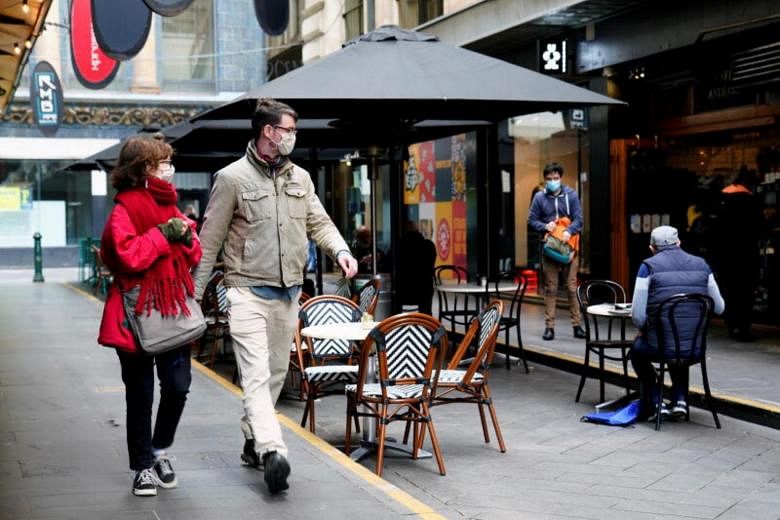SYDNEY • Australia's coronavirus hot spot of Victoria state reported two new Covid-19 cases yesterday after posting no infections in the previous two days, as state capital Melbourne emerged from three months-plus of a hard lockdown.
Restaurants and cafes in worst-hit city Melbourne - home to five million people - reopened from yesterday and limits on social gatherings at home have been eased, allowing two adults and dependants from one house to visit another household.
Melbourne was put into lockdown in early July after a second wave that pushed daily case numbers to over 700 in early August.
"Around 180,000 workers can return to work on site. That is an achievement that every single Victorian should be proud of," the state's Premier Daniel Andrews told a regular media briefing.
"We all have to follow the rules, to protect staff, to protect customers, to protect this fragile thing that we have built...So we can have the Christmas we have been looking forward to, with the people we have missed the most."
Australia has recorded just over 27,500 infections, far fewer than many other developed countries.
Victoria, the second-most populous state, has accounted for more than 90 per cent of the country's 907 deaths. It reported two deaths in the past 24 hours.
Still, with Victoria accounting for about a quarter of the nation's gross domestic product, the restrictions have deepened Australia's first recession in almost 30 years.
The lockdown has slashed A$100 million (S$96.5 million) a day from economic activity and resulted in a daily average of 1,200 jobs being lost through August and September across the state, Mr Luke Yeaman, a Treasury department official, told a parliamentary panel this week.
Business leaders say it may take years for Melbourne to recover.
Melbourne chef Scott Pickett warned that ongoing capacity restrictions would continue to hit restaurants and cafes and that many eateries would fold once government wage subsidies end early next year.
"Some may get to Christmas, January and say they can't do this anymore," said Mr Pickett, who owns the bistro Estelle. "It's going to be a bloodbath out there at some stage."
The social costs are also mounting. The Royal Australian College of General Practitioners said demand for health services nationwide has risen by 15 per cent since early March, and by 31 per cent between September and October in Victoria.
Alcohol consumption has risen and domestic violence spiked.
"Only being allowed outside for an hour a day was awful," said Ms Tessa Patrao, 27, who is finally back at work as a primary school teacher after the 112-day stay-at-home order.
While governments in the United Kingdom, Italy and Germany have faced protests against second lockdowns, Victorians have been largely compliant. That's in part down to the popularity of the state's Labor government, which won the 2018 election by a landslide, and the high approval ratings of Premier Andrews.
The carrot-and-stick approach taken by the authorities has also helped, with A$1,500 payments for people who could not afford to self-isolate and court-imposed fines of as much as A$20,000 for repeat breaches of isolation orders.
"It would've been impossible to meaningfully police if there wasn't community support," said Dr Terry Slevin, chief executive officer of the Public Health Association of Australia. "It's an example where a compact between a government and a community that's been driven by expert advice has achieved a valuable public health outcome."
BLOOMBERG, REUTERS











